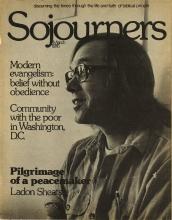The Broken Covenant: American Civil Religion in Time of Trial. By Robert N. Bellah. Seabury Press, 1975. $7.95
The Broken Covenant has received wide attention, probably as the result of the enduring interest in American civil religion first stimulated by Bellah in a 1967 Daedalus article. While several authors were quick to point out that Bellah’s suggestion was not new (Rousseau had actually coined the term “civil religion” and a wide range of historians and social and political theorists had made similar observations), the article was timely and generated a flurry of scholarly response. Without reviewing the range of response, two central questions regarding civil religion which form the backdrop for this work by Bellah should be noted: First, if there is such a phenomenon as American civil religion, what will be the result of its apparent demise? Second, and related to the first question, is civil religion necessary for the cohesiveness of a society and thus to be valued?
The Broken Covenant is based on six lectures given in 1971 at Hebrew Union College in Cincinnati. Bellah begins by asserting that the emerging problems in the United States are ultimately moral and religious, arguing a la Durkheim that a set of religious understandings are basic for the cultural legitimation of a society. Thereby, Bellah chooses to define religion functionally rather than substantively, and this is simply inadequate.
Read the Full Article

